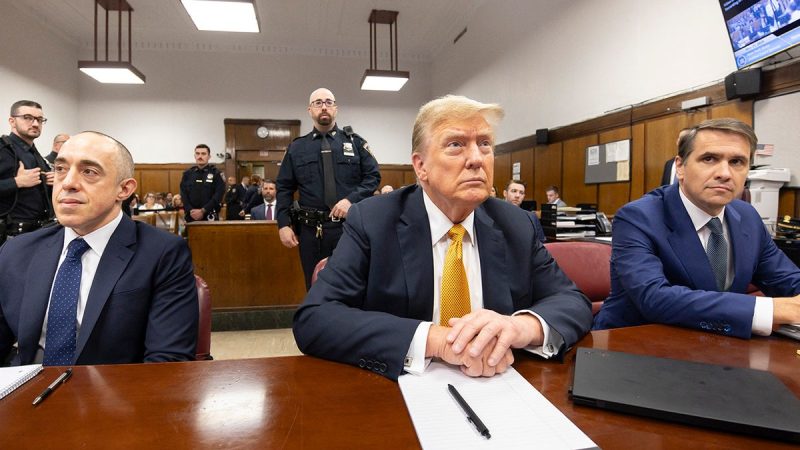Judge Juan Merchan is expected to bring jurors back into court Tuesday morning to hear closing arguments in New York v. Trump from Manhattan prosecutors and defense attorneys for former President Trump in his unprecedented criminal trial.
The jury has been away from the courtroom for a week, after the evidentiary portion of the trial concluded last Tuesday. Due to scheduling conflicts and the Memorial Day holiday, the jury will return at 9:30 a.m. Tuesday to hear summations of the case from prosecutors and defense attorneys before deliberating on a verdict.
The Manhattan case, brought by District Attorney Alvin Bragg against Trump turned testy last Monday when defense attorneys made a second attempt to dismiss the case, saying no evidence had been presented by the prosecution to connect the former president to any falsification of business records.
Merchan still has not announced his decision on the matter.
Prosecutors needed to prove beyond a reasonable doubt that Trump falsified records to conceal a $130,000 payment to Stormy Daniels, a pornographic performer, in the lead-up to the 2016 election to silence her about an alleged affair with Trump in 2006.
The former president has maintained his innocence.
Merchan said he expects closing arguments will take the entire day Tuesday, and has asked jurors if they are able to stay late. It is possible closing arguments continue into Wednesday.
Merchan plans to charge the jury on Wednesday, and estimated his instructions for jurors will take approximately an hour. Merchan will then send jurors to deliberate.
Trump will be required to remain at the courthouse during deliberations, in case there is a note from the jury. The former president needs to be present for the reading of any jury notes.
Defense attorneys motioned for dismissal after Michael Cohen, Trump’s former attorney and the prosecution’s ‘star witness,’ finished his testimony.
Cohen testified that he personally made the $130,000 payment to Daniels using a home equity line of credit in an effort to conceal the payment from his wife. Cohen said he did this because Trump told him to ‘handle it’ in order to prevent a negative story from coming out ahead of the election.
But Trump’s defense attorneys maintained that the president never directed Cohen to make the payment.
Cohen testified that he was ‘reimbursed $420,000’ for the $130,000 he paid to Daniels. Cohen said former Trump Organization CFO Allen Weisselberg suggested he ‘gross up’ the payments and that Trump knew the details of the reimbursement.
The prosecution presented Cohen with 11 checks totaling $420,000. Cohen confirmed that they were all received and deposited. The checks had a description of a ‘retainer,’ which Cohen said was false.
But Trump defense attorney Todd Blanche asked for an immediate order of dismissal, saying there is ‘no evidence’ that the filings or business records at the center of the case were false, that there are ‘absolutely no false business filings.’
Blanche said there is no dispute that Cohen acted as a personal attorney for Trump in 2017 and that there is no evidence or intent by Trump to mislead, hide or falsify business records.
Blanche said there would be records of intent to defraud, if they existed, and that there were no other crimes being covered up. He said there was no evidence of anyone thinking of a campaign finance charge when the payment was made to Daniels or when Cohen and Weisselberg developed the repayment plan.
Blanche said Trump paid Cohen a $35,000 ‘monthly retainer,’ which is what the records state, and said there is no evidence from any witness to prove any criminal intent.
Reflecting on the prosecution’s case, Blanche pointed to the alleged ‘catch and kill’ strategy used to prevent a ‘demonstrably false’ story a Trump Tower doorman had about Trump from being published.
‘How on Earth is keeping a false story from voters criminal?’ Blanche asked, adding it was ‘not a catch and kill and certainly not a criminal catch and kill.’
‘There is no way the court should let this case go to the jury with Mr. Cohen’s testimony,’ Blanche said, adding that Cohen has lied under oath in the past and during the current criminal trial in Merchan’s courtroom.
Merchan asked Blanche if he should ‘find Mr. Cohen not credible by a matter of law,’ to which Blanche said ‘yes.’
‘So, you want me to take it out of the jury’s hands?’ Merchan asked, with Blanche responding that Cohen’s entire testimony should not be considered by the jury.
Merchan told Blanche that if Cohen’s ‘lies’ were ‘irrefutable,’ then he would be able to convince the jury of that.
The prosecution then argued that under the New York state falsifying business records statute, anyone ‘causing’ the falsified records can be punished.
‘As a matter of law, it is sufficient, more than sufficient, that the defendant set in motion the sequence of events leading to the falsification of business records,’ prosecutor Matthew Colangelo argued.
Trump spoke to reporters last Tuesday outside the courtroom, saying his defense team has already essentially ‘won’ the case. Trump said Merchan should side ‘decisively’ against Bragg.
‘Any other judge would have thrown this case out,’ Trump said.
